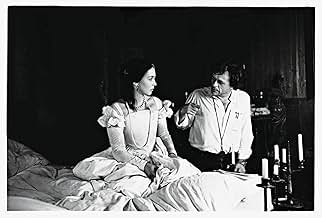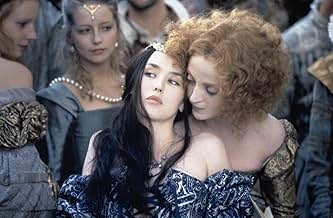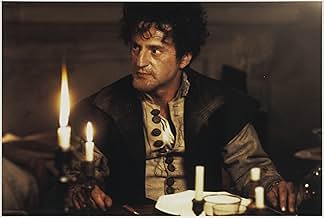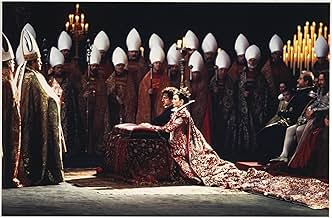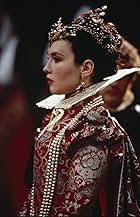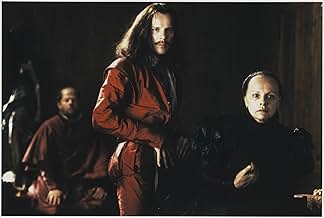AVALIAÇÃO DA IMDb
7,4/10
20 mil
SUA AVALIAÇÃO
A jovem Rainha Margot se vê presa em um casamento arranjado em meio a uma guerra religiosa entre católicos e protestantes. Ela espera escapar com um novo amante, mas se vê presa por sua pode... Ler tudoA jovem Rainha Margot se vê presa em um casamento arranjado em meio a uma guerra religiosa entre católicos e protestantes. Ela espera escapar com um novo amante, mas se vê presa por sua poderosa e impiedosa família.A jovem Rainha Margot se vê presa em um casamento arranjado em meio a uma guerra religiosa entre católicos e protestantes. Ela espera escapar com um novo amante, mas se vê presa por sua poderosa e impiedosa família.
- Direção
- Roteiristas
- Artistas
- Indicado a 1 Oscar
- 9 vitórias e 16 indicações no total
Miguel Bosé
- Guise
- (as Miguel Bosè)
Jean-Philippe Écoffey
- Condé
- (as Jean-Philippe Ecoffey)
Avaliações em destaque
Back in 1994 La Reine Margot' dispensed of every preconceived notion of traditional costume drama, bringing a radical and shocking slant on history. The lavish sets and costumes remained but the atmosphere was now tainted with bloodshed, poison, lust and incest. The regal palaces that were so stereotypically populated by loyal subjects are transformed into a viper's nest of power politics, schemes and deceit where royal heritage counts for little and deviousness is the key to success.
The year is 1572; France is torn apart amidst the conflict between Catholics and Protestants whilst the King is a mere puppet, first to his domineering, Catholic, mother (Catherine de Medici, played with superlative coldness by Virna Lisi) and later to the protestant leader Coligny. In a half hearted effort to bring peace to the land Catherine marries off her daughter Margot (Isabelle Adjani) to the protestant Henri de Navarre (Daniel Auteuil), a political manoeuvre that deludes no one. Margot and Henri are certainly a less than content couple; as they walk down the aisle they engage in a hissing match with one another where Margot succinctly informs him that Just because we're married it doesn't mean I have to sleep with you' and suggests he steer clear of her bedroom. They also fail to adhere to any form of decorum during the wedding reception; whilst Henri brawls with the Catholics (and flirts with a very youthful Asia Argento, of xXx fame) Margot goes window shopping amongst the male guests, looking for a viable one night stand. When the wedding guests prove unsatisfactory she simply dons a mask and takes to the streets, masquerading as a prostitute, and continues her search amongst the hordes of Protestant soldiers, who have gathered for her wedding, eventually settling on the dour La Mole (Vincent Perez). However any illusions of peace are shattered after a botched attempt to assassinate Coligny, as the Catholics, fearing a revolt, slaughter 6,000 Protestants in what becomes known as the St. Bartholomew's Day Massacre.
The sheer horror of the massacre is reproduced with unflinching realism by director Patrick Chireau, who manages not only to shock but also recreate an atmosphere of utter chaos, exemplified by the moment when Margot is wandering amongst the palace corridors which have been besieged by soldiers and are strewn with corpses (Margot is curtly told return to your room and lock the door'). Unfortunately some of the impact of the massacre is lost due to the fact that we know barely any of the characters who are being murdered and it begs credibility that the Protestants seemingly put up no resistance. One of the few survivors of the slaughter is La Mole, who is saved by Margot when he breaks into her chamber, looking for sanctuary, which Margot freely gives to him (and more). In the aftermath of the massacre Margot also manages to save Henri de Navarre, forging a valuable alliance in the process. However, suspicion has been aroused that she is a traitor and she finds that she is in a decidedly vulnerable position where her only hope of freedom is to flee to Navarre with Henri.
Isabelle Adjani, France's premier actress, delivers one of her finest performances as the stubborn and promiscuous Margot, who despite initially coming across as vain and conceited later earns our sympathy as she finds herself in an impossible situation, where her position in the royal family is of little consequence (her brothers love her in a perversely incestuous way and her mother sees her as an inconvenience and potential threat to her authority) and the threat of assassination always looms around the corner. Whilst the political manoeuvrings and power struggles are intriguing the same cannot be said for the tepid romance between Adjani and Perez. The pair lacks any chemistry; even their scenes of erotic passion come across as frigid and awkward. They make an attractive couple, but not a particularly convincing one.
La Reine Margot is also one of the most visually sumptuous films ever released; the big budget clearly didn't go to waste in recreating the gothic decadence of the period and the costumes were deservingly nominated for an Oscar. It's easy to view La Reine Margot' as a precursor to the acclaimed 1998 film Elizabeth', as both centre around a female historical figure who has to endure the conflict between Catholics and Protestants whilst surviving assassination attempts (usually via poison) and overcome tragedy as those who they care for are systematically murdered. Indeed if nothing else La Reine Margot' provides a chilling insight into one of history's most horrific atrocities and offers an unsettling portrait of the moral bankruptcy that pervaded throughout 16th century society.
My Score: 8 out of 10
The year is 1572; France is torn apart amidst the conflict between Catholics and Protestants whilst the King is a mere puppet, first to his domineering, Catholic, mother (Catherine de Medici, played with superlative coldness by Virna Lisi) and later to the protestant leader Coligny. In a half hearted effort to bring peace to the land Catherine marries off her daughter Margot (Isabelle Adjani) to the protestant Henri de Navarre (Daniel Auteuil), a political manoeuvre that deludes no one. Margot and Henri are certainly a less than content couple; as they walk down the aisle they engage in a hissing match with one another where Margot succinctly informs him that Just because we're married it doesn't mean I have to sleep with you' and suggests he steer clear of her bedroom. They also fail to adhere to any form of decorum during the wedding reception; whilst Henri brawls with the Catholics (and flirts with a very youthful Asia Argento, of xXx fame) Margot goes window shopping amongst the male guests, looking for a viable one night stand. When the wedding guests prove unsatisfactory she simply dons a mask and takes to the streets, masquerading as a prostitute, and continues her search amongst the hordes of Protestant soldiers, who have gathered for her wedding, eventually settling on the dour La Mole (Vincent Perez). However any illusions of peace are shattered after a botched attempt to assassinate Coligny, as the Catholics, fearing a revolt, slaughter 6,000 Protestants in what becomes known as the St. Bartholomew's Day Massacre.
The sheer horror of the massacre is reproduced with unflinching realism by director Patrick Chireau, who manages not only to shock but also recreate an atmosphere of utter chaos, exemplified by the moment when Margot is wandering amongst the palace corridors which have been besieged by soldiers and are strewn with corpses (Margot is curtly told return to your room and lock the door'). Unfortunately some of the impact of the massacre is lost due to the fact that we know barely any of the characters who are being murdered and it begs credibility that the Protestants seemingly put up no resistance. One of the few survivors of the slaughter is La Mole, who is saved by Margot when he breaks into her chamber, looking for sanctuary, which Margot freely gives to him (and more). In the aftermath of the massacre Margot also manages to save Henri de Navarre, forging a valuable alliance in the process. However, suspicion has been aroused that she is a traitor and she finds that she is in a decidedly vulnerable position where her only hope of freedom is to flee to Navarre with Henri.
Isabelle Adjani, France's premier actress, delivers one of her finest performances as the stubborn and promiscuous Margot, who despite initially coming across as vain and conceited later earns our sympathy as she finds herself in an impossible situation, where her position in the royal family is of little consequence (her brothers love her in a perversely incestuous way and her mother sees her as an inconvenience and potential threat to her authority) and the threat of assassination always looms around the corner. Whilst the political manoeuvrings and power struggles are intriguing the same cannot be said for the tepid romance between Adjani and Perez. The pair lacks any chemistry; even their scenes of erotic passion come across as frigid and awkward. They make an attractive couple, but not a particularly convincing one.
La Reine Margot is also one of the most visually sumptuous films ever released; the big budget clearly didn't go to waste in recreating the gothic decadence of the period and the costumes were deservingly nominated for an Oscar. It's easy to view La Reine Margot' as a precursor to the acclaimed 1998 film Elizabeth', as both centre around a female historical figure who has to endure the conflict between Catholics and Protestants whilst surviving assassination attempts (usually via poison) and overcome tragedy as those who they care for are systematically murdered. Indeed if nothing else La Reine Margot' provides a chilling insight into one of history's most horrific atrocities and offers an unsettling portrait of the moral bankruptcy that pervaded throughout 16th century society.
My Score: 8 out of 10
I don't pretend to know the minutiae of the historical record, but it was Definitely Not Dumas, or I lost it all in the English translations! Like many others I've always been fascinated by this episode in French history, a turbulent and savagely intolerant period and not only in France, but 1572 is yet another year that went down in infamy. This film portrays the complicated machinations performed by Catherine de Medici and her cohorts in furthering her Catholic ambitions for her country and debauched family against the perceived threat of dour Protestantism, and centred around the St. Bartholomew Day Massacre.
It's the rather beautiful Isabelle Adjani's stunning performance as Queen Margot that can leave you as breathless as she often is in the film, without her it would have been a much poorer film. She seemed to live the part, with every emotion imaginable on display. Would French breathlessness, or those huge rustling dresses sound as good dubbed into English?! On the other hand the rest of the cast are superb in their roles too, but especially Daniel Auteuil as Henri de Navarre and Jean Hugues Anglade as Charles IX, making them both extremely believable sympathetic characters when they weren't. The bloodbath and the anarchy of the Massacre and aftermath is vividly presented we are not spared a single thing in the entire film, all manner of violence and depravity is non-gratuitously displayed. It's impossible to convey a part of what happens in this film the same as it must have been impossible for the film to convey a fraction of what happened in that era too: it really is a must-see. I've seen it a number of times now since 1994 and I find something new I hadn't spotted before every time. It's a film that can make you realise (if you didn't before) that millions of ordinary folk all around the world could and still can believe in such arrant religious nonsense to the point of committing multiple ghastly murders in the name of empty air.
Apart from all that, it's a beautifully crafted film, the best of its kind there's ever been.
It's the rather beautiful Isabelle Adjani's stunning performance as Queen Margot that can leave you as breathless as she often is in the film, without her it would have been a much poorer film. She seemed to live the part, with every emotion imaginable on display. Would French breathlessness, or those huge rustling dresses sound as good dubbed into English?! On the other hand the rest of the cast are superb in their roles too, but especially Daniel Auteuil as Henri de Navarre and Jean Hugues Anglade as Charles IX, making them both extremely believable sympathetic characters when they weren't. The bloodbath and the anarchy of the Massacre and aftermath is vividly presented we are not spared a single thing in the entire film, all manner of violence and depravity is non-gratuitously displayed. It's impossible to convey a part of what happens in this film the same as it must have been impossible for the film to convey a fraction of what happened in that era too: it really is a must-see. I've seen it a number of times now since 1994 and I find something new I hadn't spotted before every time. It's a film that can make you realise (if you didn't before) that millions of ordinary folk all around the world could and still can believe in such arrant religious nonsense to the point of committing multiple ghastly murders in the name of empty air.
Apart from all that, it's a beautifully crafted film, the best of its kind there's ever been.
10Johnny B
Alexandre Dumas should certainly be satisfied with this superb adaptation of his classic. The setting is excellent and it gives a wonderful image of 16th century France. Naturally the highlight of the movie is the re-enactment of the St. Bartholomew's Day massacre. The horrendous scenes of the murders in all their crudity are terrific. The actors did a wonderful job here. Isabelle Adjani is, as usual, terrific. Her nude scenes, depicting the queen's adultery, lust and incestuous affairs are acted in such a way that they are a form of art. Vincent Perez is in one of his best roles - his interpretation of La Môle is second only to his acting in "Indochine". The great Virna Lisi is simply marvellous posing as Cathérine de Médicis - no wonder she won the Best Actress Award at Cannes. She is the ambitious woman par excellence, stopping at nothing to get where she wants, not even if she has to see her sons being killed one by one and sell her daughter in a convenient marriage to unite the Catholics and the Protestants. The others, especially Asia Argento, impersonating the tragic countess Charlotte de Sauve did a good job too. A very well deserved Prix du Jury.
7=G=
"Queen Margot" is a French epic drama which tells of the political forces at work in France at the time of the St. Bartholomew's Day massacre which signaled the beginning of the end of the "religious wars" raging in France in the early to mid 16th century. Queen Margot (Adjani) is at the center of this maelstrom of wickedness and treachery which looks at everything from poison lip rouge to a bloody holocaust. An elaborate award winning production, "Queen Margot" presents its history realistically with no clear sense of good or evil - unlike "Braveheart", for example - with countless extras, spectacular costuming, and artistry in cinematography. Well worth its 2.5 hour run, this dark film, based on the novel by A. Dumas, is lacking in the didactic and will be difficult to follow for all but those with historical knowledge of the place and time. A little research prior to watching the film can go a long way toward understanding the complexities of the story.
For the American people that have seen this excellent French movie, I will say just one thing: in many countries around the world we get to see movies from abroad with subtitles. Most of the movies that we see in South American countries come either from North America or Europe and we don't usually complain about the subtitles. Only kids movies are dubbed in Spanish. A great part of the romance or charm about French movies comes from the fact that they are actually spoken in French. Nobody in these films expects the rest of the world to understand as they speak but to make a little effort and appreciate the beauty in each language is something I think is missing in American culture. I've seen nothing but comments on how difficult it was for some members of the American public to understand this film. I only ask myself: in times of globalization, isn't it interesting to learn from people from other parts of the world in their own language, specially a French film based on a French novel by the French Alexandre Dumas, placed in the 16th century, directed by one of France's best directors and acted by some of the most wonderful French actors and actresses of the last decades? Would you want to see this film in English? Sorry, but I think you would be missing a great deal of the depth and emotion of this unique film!!!
Você sabia?
- CuriosidadesPatrice Chéreau edited the original cut of the film (roughly 160 minutes) to a shorter 138 minutes for international release. This was due to the disappointing box-office performance in France and the criticism (by, among others, Variety critic Todd McCarthy) of the film as being too violent and often incoherent. The French press were scathing of this 'American censorship' (they described the film as having been 'given a face-lift' for American audiences), but the new version was defended by various French critics being both more coherent whilst also maintaining Chereau's artistic vision. The shorter cut was later released in France too, in the hopes of increasing the film's box-office takings. 20 years later, Chereau slightly re-edited his film again and re-mastered it for a new BluRay release with a running time of 161 minutes. This was one of Chereau's last completed acts before his untimely death, so it can be regarded as the definitive version.
- Erros de gravaçãoLa Mole is shot in the legs and the wounds and bloodstains are visible as he goes to execution. But when Margot views his semi-naked corpse, his legs are unmarked.
- Citações
Charles IX: One who gives life is no longer a mother once she takes that life back.
- ConexõesFeatured in The 52nd Annual Golden Globe Awards (1995)
Principais escolhas
Faça login para avaliar e ver a lista de recomendações personalizadas
- How long is Queen Margot?Fornecido pela Alexa
Detalhes
- Data de lançamento
- Países de origem
- Idiomas
- Também conhecido como
- Queen Margot
- Locações de filme
- Empresas de produção
- Consulte mais créditos da empresa na IMDbPro
Bilheteria
- Orçamento
- DEM 42.000.000 (estimativa)
- Faturamento bruto nos EUA e Canadá
- US$ 1.304.237
- Fim de semana de estreia nos EUA e Canadá
- US$ 4.985
- 11 de mai. de 2014
- Faturamento bruto mundial
- US$ 1.318.578
Contribua para esta página
Sugerir uma alteração ou adicionar conteúdo ausente



